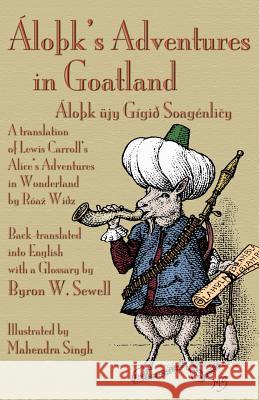ÁloÞk's Adventures in Goatland: (ÁloÞk üjy Gígið Soagénličy): A Translation of Lewis Carroll's Alice's Adventures in Wonderland by Róaz Wiðz, Bac » książka
ÁloÞk's Adventures in Goatland: (ÁloÞk üjy Gígið Soagénličy): A Translation of Lewis Carroll's Alice's Adventures in Wonderland by Róaz Wiðz, Bac
ISBN-13: 9781904808763 / Angielski / Miękka / 2011 / 140 str.
ÁloÞk's Adventures in Goatland: (ÁloÞk üjy Gígið Soagénličy): A Translation of Lewis Carroll's Alice's Adventures in Wonderland by Róaz Wiðz, Bac
ISBN-13: 9781904808763 / Angielski / Miękka / 2011 / 140 str.
(netto: 65,38 VAT: 5%)
Najniższa cena z 30 dni: 68,27 zł
ok. 16-18 dni roboczych
Bez gwarancji dostawy przed świętami
Darmowa dostawa!
Roa Wioz (1882-1937), the locally-admired though otherwise little-known Zumorgian translator, spent seventeen years of his miserable life (when he wasn't tending to his beloved goats) translating Lewis Carroll's classic "Alice's Adventures in Wonderland" into Zumorigenflit and transposing it into u ian culture. Sadly, u was swallowed up by the Soviet Union in 1947. Most of its citizens were either purged (lined up and summarily shot when they refused to combine their goats into a communal herd) or transported to the Gulag for political re-education and attitude adjustment. All cultural artifacts were systematically destroyed and most Zumorigenflit books were burned as part of the Soviet effort to obliterate u, along with any memory of it. The only known present-day u ian survivors of The Great u Purge (other than any possible survivors of the Gulag, whose descendants might conceivably live in Siberia) are now toothless old women, whose parents fled with them as infants from u to Transjordan the night of the purge. Today they live (if you can call it that) in a squalid refugee camp on the desert outskirts of Amman surrounded by very unhappy and angry displaced Palestinians. Some of these u ian refugees are still able to speak a little Zumorigenflit, though few of them can read it. For those interested in such esoteric things, "Alo k ujy Gigio Soagenli y" was first published by the Itadabukan Press in the capital city of Sprutni ovyurt in 1919. The city, which was mistakenly thought to be a German forward supply area, was literally flattened and burned to the ground by Royal Air Force saturation bombing in 1943, and all that remains of it are a few remnants of the ancient Palace's foundations and a gigantic reinforced concrete statue of Joseph Stalin, whose face has been shattered by what was probably machine gun target practice. The original story has here been updated to modern times, as if this strange, harsh, and dangerous land still existed in the modern world. It doesn't, except in my imagination and that of Mahendra Singh, whose heart swells with the Song of the Goat. -- Byron W. Sewell
Róaž Wi?z (1882-1937), the locally-admired though otherwise little-known Zumorgian translator, spent seventeen years of his miserable life (when he wasnt tending to his beloved goats) translating Lewis Carrolls classic "Alices Adventures in Wonderland" into Zumorigénflit and transposing it into ?úgian culture. Sadly, ?úg was swallowed up by the Soviet Union in 1947. Most of its citizens were either purged (lined up and summarily shot when they refused to combine their goats into a communal herd) or transported to the Gulag for political re-education and attitude adjustment. All cultural artifacts were systematically destroyed and most Zumorigénflit books were burned as part of the Soviet effort to obliterate ?úg, along with any memory of it. The only known present-day ?úgian survivors of The Great ?úg Purge (other than any possible survivors of the Gulag, whose descendants might conceivably live in Siberia) are now toothless old women, whose parents fled with them as infants from ?úg to Transjordan the night of the purge. Today they live (if you can call it that) in a squalid refugee camp on the desert outskirts of Amman surrounded by very unhappy and angry displaced Palestinians. Some of these ?úgian refugees are still able to speak a little Zumorigénflit, though few of them can read it. For those interested in such esoteric things, "Álo?k üjy Gígi? Soagénličy" was first published by the Itadabükan Press in the capital city of Sprutničovyurt in 1919. The city, which was mistakenly thought to be a German forward supply area, was literally flattened and burned to the ground by Royal Air Force saturation bombing in 1943, and all that remains of it are a few remnants of the ancient Palaces foundations and a gigantic reinforced concrete statue of Joseph Stalin, whose face has been shattered by what was probably machine gun target practice. The original story has here been updated to modern times, as if this strange, harsh, and dangerous land still existed in the modern world. It doesnt, except in my imagination and that of Mahendra Singh, whose heart swells with the Song of the Goat. -- Byron W. Sewell











